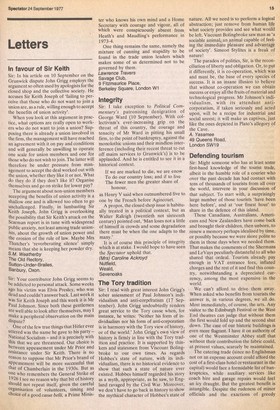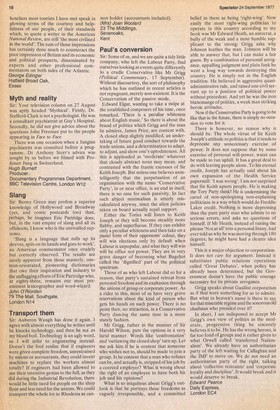Defending tourism
Sir: Might someone who has at least some first-hand knowledge of the tourist trade, albeit in the humble role of a courier who over the past decade has had contact with tens of thousands of tourists from all over the world, intervene in your discussion of that subject. To start with, a surprisingly large number of those tourists 'have been here before', and at 'our finest hour' to share in the defence of this island.
These Canadians, Australians, Americans and New Zealanders have come back and brought their children, then unborn, to renew a memory perhaps idealised by time, or possibly because we were More polite to them in those days when we needed them. That makes the comments of the Shermans and LeVays peculiarly distasteful to all who shared that ordeal. Tourists already pay enough in VAT entrance fees, inflated charges and the rest of it and find this country, notwithstanding a depreciated currency, among the most expensive in the world.
We can't afford to drive them away. When asked who benefits from tourists the answer is, in various degrees, we all do. Most immediately, of course, the arts. Any visitor to the Edinburgh Festival or the West End theatres can judge that without them the first would fold up and the second shut down. The case of our historic buildings is even more flagrant. I have it on authority of one of the Westminster Abbey staff that without their contribution the fabric could, at present values, scarcely be maintained.
The catering trade (since no Englishman not on an expense account could afford the cost of a first-class hotel orrestaurant in the capital) would face a formidable list of bankruptcies, while auxiliary services like coach hire and garage repairs would feel an icy draught. But the greatest benefit is intangible. Despite the rudeness of minor officials and the exactions of greedy hoteliers most tourists I have met speak in glowing terms of the courtesy and helpfulness of our people, of their standards which, to quote a writer in the American National Review, are still 'the most civilised in the world'. The sum of those impressions has certainly done much to counteract the poor impression of Britain and its economic and political prospects, disseminated by experts and other professional commentators on both sides of the Atlantic. George Edinger Hatfield Broad Oak, Essex



































 Previous page
Previous page